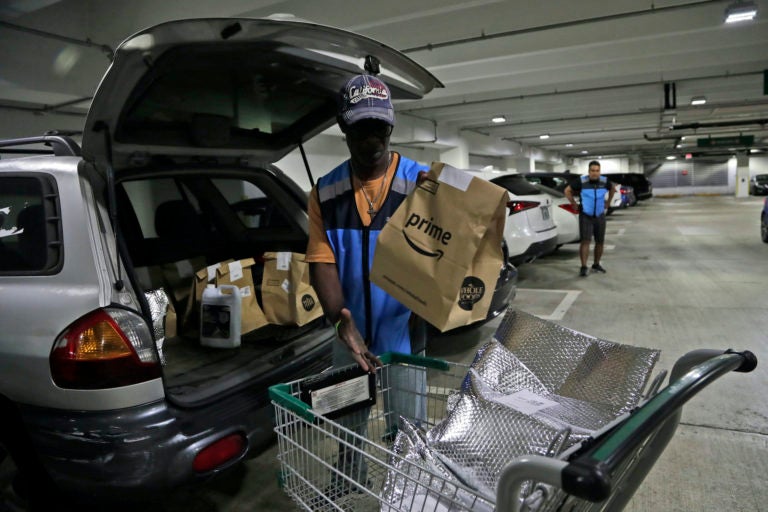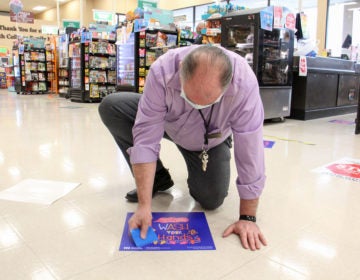Counting toilet paper squares, composting: This how we deal with pandemic-era trash
Stay-at-home rules raise lots of new questions: How to manage all those delivery bags? Dispose of sanitizing spray and paper goods, or reuse them?
Listen 1:20
Samuel Diaz, a delivery worker for Amazon Prime, loads his vehicle with groceries from Whole Foods, Tuesday, March 31, 2020, in Miami, during the coronavirus pandemic. (Lynne Sladky/AP Photo)
Some rules for managing coronavirus risk seem simple: Wash your hands. Stop touching your face. Stay inside.
But those rules have created hundreds of other disruptions. How should grocery shoppers manage paper, plastic or reusable bags? Should they use and dispose of sanitizing spray and paper goods, or reuse and make them stretch?
In a world deluged by disinfectant wipes and paper towels, what can everyday people do to avoid creating more trash?
Some are getting creative. A shortage of cleaning products like paper towels and Lysol wipes has prompted a variety of DIY substitutes, as offered by Facebook commenters in Philadelphia neighborhood groups: towels soaked in diluted bleach, homemade disinfectants, washable rags made from old cloth napkins and T-shirts. One person offered a personal “recipe” for baby wipe replacement using paper towels and rubbing alcohol.
Cassidy Hilburn, a preschool assistant and college student in Fairmount, said she’s been creative in other ways.
“I’d say my food waste has decreased exponentially,” Hilburn wrote in a Facebook message to a WHYY reporter. “I have time to repurpose every last scrap in my kitchen into a new meal, as my own cooking is now my only source of food… the amount I throw away/recycle has decreased too because I’m not getting any takeout or coffee in paper cups.”
The same is true for Sarah Millinghausen, a West Philly resident who wrote that while her use of disinfecting wipes has gone up — “I never used [them] before, now I use maybe 5-7 to wipe down groceries which we get approx. every 2 weeks” — her general waste consumption has gone down. She’s using fewer disposables at home than she did in the office, and limiting her online purchases in hopes that she’ll minimize the exposure of postal and warehouse workers.
“Some things I’d normally buy are laughable to think about right now,” Millinghausen added. “Banana Republic 50% off emails go right in the trash.”
One woman has even gone so far as to count the squares of toilet paper she and her family use regularly.
“On average it’s seven,” Jessica Sierra-Silva wrote, “but also I have an attachable bidet … that I installed after this chaos [and] that’s helped immensely.”
The Lehigh County resident started counting squares 2 1/2 weeks ago, shortly after Gov. Tom Wolf ordered closure of all non-essential businesses across Pennsylvania. She’s trying to stretch her resources, “but more than that, I am trying to retrain my thoughts and habits. I have gone to using cloth towels or old clothing as rags for cleaning, I have rationed our food as much as possible to allow for more infrequent trips in public.”
These past few weeks, Sierra-Silva’s been planning a garden for the summer and saving egg shells, coffee grounds, and food scraps for compost. Would she have shifted her behavior if she weren’t in a quarantine state of mind?
“Oh, I’d never think about it,” she said immediately. “I was way more wasteful … I was concerned about climate change [and] about wasteful consumption, but I never put those things in practice. I’m putting them into practice now, and quite frankly, finding that they’re way easier to do than what I’ve been doing for years, which is buying, buying, buying, and throwing things out.”
‘Climate anxiety, COVID anxiety’
But not everyone is reducing waste as easily or effectively. Some people report seeing gloves and masks dumped on the sidewalk or littering the asphalt outside local supermarkets.
“The sheer number of gloves on the ground is unreal,” wrote Cobbs Creek resident Jennifer Que Farmer on a Facebook group comment thread. “The parking lots are covered.”
Dealing with this debris is doubly difficult, given already overworked grocery store employees, community concern about coronavirus exposure through surface contact and some recent delays in trash pickup. For some, the tradeoff between environmental impact and risking illness is just too high.
“You can’t avoid plastic bags when you’re getting groceries delivered,” Lindsay Moody, a young mother in West Philly, pointed out.
Before the threat of a coronavirus outbreak, Moody used to shop for groceries multiple times a week, armed with reusable bags for everything from fruit to dry goods. She could make it for weeks without buying anything wrapped in plastic. Now that she’s ordering delivery and staying at home, that’s become impossible.
“It’s very frustrating … being responsible with social distancing has removed all choice from my usual buying habits,” she added. “I have environmental anxiety in addition to the COVID anxiety. I can’t relieve one without aggravating the other.”
It’s still unclear what the long-term environmental impact of coronavirus-related shutdowns will be. The outbreak has driven a fall in global economic activity, and a corresponding drop in greenhouse-gas emissions. Locally, traffic reductions and public transportation have caused a similar decrease in air pollution, meaning Philly air is cleaner than it’s been in years.
At the same time, the Environmental Protection Agency has relaxed its enforcement of rules meant to ensure air and water quality, although New Jersey, New York, Delaware, and Pennsylvania state and local governments manage oversight for most federal laws.
In the United States, where recycling is regulated on a local level, some cities are even grappling with whether to suspend services due to virus spread, Bloomberg reports. On Friday, Philadelphia Mayor Jim Kenney announced a reduced schedule for recycling collection until at least mid-May.
WHYY is your source for fact-based, in-depth journalism and information. As a nonprofit organization, we rely on financial support from readers like you. Please give today.




![CoronavirusPandemic_1024x512[1]](https://whyy.org/wp-content/uploads/2020/03/CoronavirusPandemic_1024x5121-300x150.jpg)



